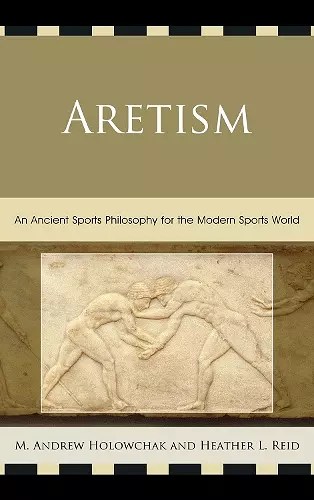Aretism
An Ancient Sports Philosophy for the Modern Sports World
Heather Reid author Mark Holowchak author
Format:Paperback
Publisher:Bloomsbury Publishing PLC
Published:13th Feb '13
Currently unavailable, and unfortunately no date known when it will be back

Aretism: An Ancient Sports Philosophy for the Modern Sports World applies a robust ancient ethic to the widely-acknowledged problems faced by modern sports. Aretism—from the Greek word arete ("excellence")—draws a balance between the hard commercialism of modern sports culture and the soft playfulness of recreational models to recover the value of sport for individuals, education, and society at large. The authors’ approach proposes practical strategies for athletes, coaches, and physical educators to use when facing ethical challenges in the modern world.
Holowchak and Reid present Aretism as a tripartite model of athletic excellence focused on personal, civic, and global integration. They reject the personal and social separation characteristics of much of contemporary moral reasoning. Aretism creates a critical and normative framework within which athletic agents can aim for spirited, but morally sensitive, competition by seeking the betterment not only of themselves, through athletic competition, but also of their teammates, fellow competitors, and even their communities.
Holowchak and Reid also present a historical overview of sport and a critique of two traditional models—the martial/commercial model and the aesthetic/recreational model. This book is most applicable to students and academics concerned with the philosophy of sport, but will be of interest to all those in sports professions, including coaches, trainers, and athletes.
With the news dominated by college sports scandals, and professional athletics by strikes, lockouts, and superstar athletes' demands for ever larger contracts, this book's claim that contemporary sports is dominated by a martial/commercial model rings true. The commercial aspect is all too apparent. The martial aspect emphasizes winning at all costs, treats opponents as the enemy, and embraces aggression and individualism as means to external goals. This book also rejects an opposite approach—the aesthetic/recreational model, which sees sports as just for fun. Instead Holowchak (Rider Univ.) and Reid (Morningside College) propose returning sports to the ancient Greek ideal of arete, or excellence. Aretism demands 'respect for human limitations' as well as the view that 'victory in sport has no intrinsic value and that competitive sport is a good insofar as it is a means to human improvement.' The authors offer aretism as the Aristotelian mean between the martial/commercial and aesthetic/recreational approaches. Sports in higher education should promote virtue (in the sense of arete) or be abolished, which the authors acknowledge is not likely to happen. Copious endnotes to the 22 chapters and a good index make this book a useful resource. Summing Up: Recommended. Lower-level undergraduates and above; general readers. * Choice Reviews *
Aretism: An Ancient Sports Philosophy for the Modern Sports World is accessible, rigorous, and contains numerous historical and contemporary sporting examples that are both helpful and interesting. It will be very beneficial as a text in courses dealing with the history and philosophy of sport. The book could also be profitably used in a more general course in ethics. Aretism should be read by academics and students interested in the history, philosophy, and contemporary significance of sport. Moreover, I would urge athletes, coaches, administrators, fans, parents, and other sport practitioners to read and then seek to cultivate in their respective contexts this valuable and excellent approach to the human practice of sport. * Journal of the Philosophy of Sport *
Their book provides a substantial and necessary critique of modern sport, yet pushes back against those who envision school-related sport as merely recreational. ... Each chapter is less than 10 pages in length, allowing a snapshot of important issues and engagement with numerous (and predominantly) American sporting examples… Many examples will resonate with readers, while each is supported by concise argumentation. For instance, a particular strength of the book is its timely raising of significant examples that question gender stereotypes and inequalities in sport. ... The book broadens educators’ perspectives and provides another avenue for the incorporation of virtue-based ethics. * The Journal of Catholic Education *
Aretism is a subtle and engaging attempt to show historical connections between the prized character traits of classical antiquity and modern commercialized sports. Written in uncluttered prose and full of great examples, it is an accessible and thought-provoking re-statement of sporting virtues. -- Michael McNamee, Swansea University
Aretism will be one of the most valuable books for those interested in the history of sport, and even more so for those who want to think about the cultural significance of sport—and its problems—in our own times. Reid and Holowchak have thought long and hard about these issues, and this book is a gift to us all. -- Drew A. Hyland, Trinity College
Just what we have come to expect from these two authors: a broad sweep at the historical level, a comprehensive account at the theoretical level, married with punchy and insightful analyses of particular issues and events. The sheer scope of the enterprise, together with the telling detail, is astonishing. I read this like an 'I couldn't put it down' novel. An impressive achievement. -- Jim Parry, University of Leeds
ISBN: 9780739182086
Dimensions: 230mm x 155mm x 17mm
Weight: 363g
234 pages